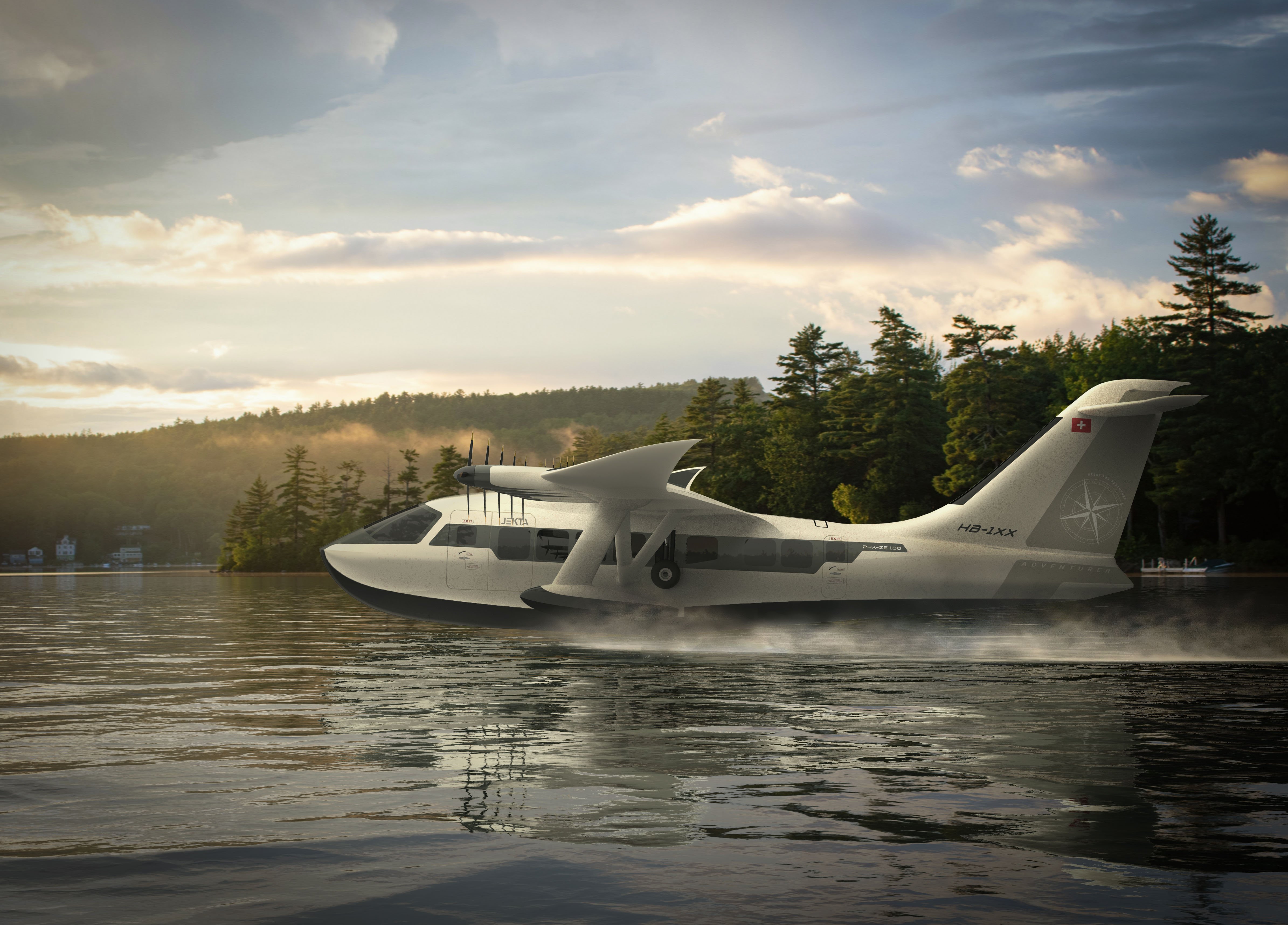Click Here to View This Page on Production Frontend
Click Here to Export Node Content
Click Here to View Printer-Friendly Version (Raw Backend)
Note: front-end display has links to styled print versions.
Content Node ID: 419937
Air charter broker Gayo Aviation has signed up as the launch customer for the PHA-ZE 100 electric amphibious aircraft being developed by Swiss-based start-up Jekta. The company says it will make the aircraft available for environmental and experiential tourism, as well as for sale or lease to charter operators seeking to diversify their fleets and scheduled regional airlines looking to connect underserved communities.
PHA-ZE stands for Passenger Hydro Aircraft Zero Emission and Jekta says the aircraft will have a range of around 150 km (94 miles), carrying 19 passengers at speeds of up to 135 knots (155 mph). The design features 10 wing-mounted propellers, each with its own 180-kW electric motor mounted on a 30-meter (98-foot) wing. Jekta is aiming to certify the PHA-ZE 100 under EASA and FAA Part 23 rules for fixed-wing aircraft and get into commercial service by 2029.
In addition to covering the purchase of 10 PHA-ZE 100s, the letter of intent signed with Gayo includes the provision of ground support equipment for charging and replacing the PHA-ZE 100’s batteries; tools and component support for the first year of operation; training for two pilots and two technicians; and a three-year airframe warranty. The company was founded in 2017 and has offices in Sweden and Dubai.
“We want to be among the first to provide our customers with a truly sustainable option to transport their passengers,” said Gayo Aviation's CEO Gisle Dueland. “With the potential to reduce per-passenger-per-hour costs by more than 70 percent compared to current seaplanes, we can satisfy that need.”
Jekta, which unveiled its plans in November 2022, says the deal demonstrates industry faith in the PHA-ZE 100 as its CEO George Alafinov continues negotiations with a second potential customer in the Persian Gulf. “Sustainability does not have to mean a compromise in comfort or capability and the PHA-ZE 100 has been designed to meet these needs,” he explained. “It also satisfies the increasing demand and opportunity to use water as infrastructure, the expansion of seaplane routes, and provides a sustainable, optimized solution to replace aging seaplanes.”
Water-based Air Services Lower Infrastructure Costs
According to Jekta, its designers have optimized the PHA-ZE 100 to serve coastal and island communities as well as regional routes now limited by high operational costs and to support new low-cost, sustainable services between cities without the need for the installation of expensive land infrastructure. It could also operate from some lakes and rivers, such as the Amazon in Brazil and to support eco-tourism in national parks.
Jekta plans to build the PHA-ZE 100 with an all-composite fuselage that can land directly on water without external “floater” structures. According to Alafinov, the approach reduces drag and will allow the aircraft to land and take off in waters with a wave height of up to almost four feet (1.2 meters) and minimize maintenance requirements compared with those for traditional metal amphibious airplanes.
Alafinov told FutureFlight that Jekta's plans to electrify amphibious aircraft will breathe new life into a sector that he said has been stagnating due to a lack of suitable equipment. "The market is in dire need of something new because the engines of current aircraft are difficult to maintain and because electric aircraft will have much lower operating costs," he commented. "There has been nothing new available since the [Dornier] Seastar in the 1980s."
Jekta estimates that typical routes currently operated by aging seaplanes average little more than 74 km and that PHA-ZE 100 operators would be able to sell tickets for as little as $25 to $50, widening the market in underserved remote communities. The aircraft could be configured to carry equipment for high-end tourist trips, such as kayaks and scuab diving gear, and could also be used for freight and air ambulance operations.
Alafinov sees potential demand in the Caribbean region and in island nations like the Maldives, where Trans Maldivian Airways currently operates a fleet of DHC-6 Twin Otter turboprop aircraft on flights to a dozen or so atolls across the Indian Ocean nation. India, which Jekta sees as another market ripe for growth in amphibious aviation, is currently served by just one operator with a single DHC-6 Twin Otter aircraft.
Potentially, an electric amphibious aircraft could also overcome environmental concerns, both in terms of eliminating carbon dioxide emissions and reducing noise. For instance, environmental restrictions in Switzerland currently forbid seaplane operations on the country's large lakes.
Green Options For Amphibious Flight
This year, Jekta has begun fund-raising to support its plan to bring a new-build design to a market already being contested by electric propulsion developer MagniX with plans to electrify both the Twin Otter and the DHC-2 Beaver, which has already been flown by Canadian regional operator Harbour Air. Separately, Ampaire is working on plans to convert Textron's single-engine Grand Caravan to hybrid-electric propulsion with markets such as Hawaii and the Caribbean in its sights.
From its base in the Swiss Aeropole business park at Payerne Airport, Jekta is now applying for its design organization approval as it completes the preliminary design phase. By 2024, the company aims to be ready to start building a technology demonstrator for the PHA-ZE 100, followed by a full-scale prototype in 2027. It intends to name several key partners for the program, and says it has already chosen an electric motor supplier.
The Jekta team has its roots in Russian private company AeroVolga, which developed the LA-8 and D-Borey amphibious aircraft. This venture was founded by George Alafinov's father in 2002, with the family having later decided to relocate their business outside Russia.
